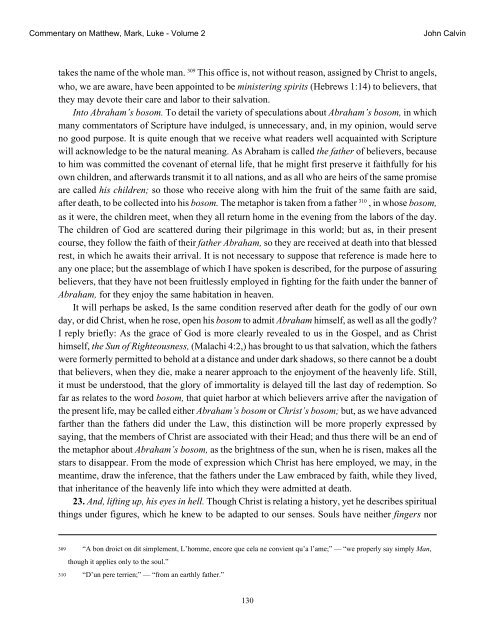Commentary on Matthew, Mark, Luke - Volume 2.pdf
Commentary on Matthew, Mark, Luke - Volume 2.pdf
Commentary on Matthew, Mark, Luke - Volume 2.pdf
You also want an ePaper? Increase the reach of your titles
YUMPU automatically turns print PDFs into web optimized ePapers that Google loves.
<str<strong>on</strong>g>Commentary</str<strong>on</strong>g> <strong>on</strong> <strong>Matthew</strong>, <strong>Mark</strong>, <strong>Luke</strong> - <strong>Volume</strong> 2<br />
takes the name of the whole man. 309 This office is, not without reas<strong>on</strong>, assigned by Christ to angels,<br />
who, we are aware, have been appointed to be ministering spirits (Hebrews 1:14) to believers, that<br />
they may devote their care and labor to their salvati<strong>on</strong>.<br />
Into Abraham’s bosom. To detail the variety of speculati<strong>on</strong>s about Abraham’s bosom, in which<br />
many commentators of Scripture have indulged, is unnecessary, and, in my opini<strong>on</strong>, would serve<br />
no good purpose. It is quite enough that we receive what readers well acquainted with Scripture<br />
will acknowledge to be the natural meaning. As Abraham is called the father of believers, because<br />
to him was committed the covenant of eternal life, that he might first preserve it faithfully for his<br />
own children, and afterwards transmit it to all nati<strong>on</strong>s, and as all who are heirs of the same promise<br />
are called his children; so those who receive al<strong>on</strong>g with him the fruit of the same faith are said,<br />
after death, to be collected into his bosom. The metaphor is taken from a father 310 , in whose bosom,<br />
as it were, the children meet, when they all return home in the evening from the labors of the day.<br />
The children of God are scattered during their pilgrimage in this world; but as, in their present<br />
course, they follow the faith of their father Abraham, so they are received at death into that blessed<br />
rest, in which he awaits their arrival. It is not necessary to suppose that reference is made here to<br />
any <strong>on</strong>e place; but the assemblage of which I have spoken is described, for the purpose of assuring<br />
believers, that they have not been fruitlessly employed in fighting for the faith under the banner of<br />
Abraham, for they enjoy the same habitati<strong>on</strong> in heaven.<br />
It will perhaps be asked, Is the same c<strong>on</strong>diti<strong>on</strong> reserved after death for the godly of our own<br />
day, or did Christ, when he rose, open his bosom to admit Abraham himself, as well as all the godly?<br />
I reply briefly: As the grace of God is more clearly revealed to us in the Gospel, and as Christ<br />
himself, the Sun of Righteousness, (Malachi 4:2,) has brought to us that salvati<strong>on</strong>, which the fathers<br />
were formerly permitted to behold at a distance and under dark shadows, so there cannot be a doubt<br />
that believers, when they die, make a nearer approach to the enjoyment of the heavenly life. Still,<br />
it must be understood, that the glory of immortality is delayed till the last day of redempti<strong>on</strong>. So<br />
far as relates to the word bosom, that quiet harbor at which believers arrive after the navigati<strong>on</strong> of<br />
the present life, may be called either Abraham’s bosom or Christ’s bosom; but, as we have advanced<br />
farther than the fathers did under the Law, this distincti<strong>on</strong> will be more properly expressed by<br />
saying, that the members of Christ are associated with their Head; and thus there will be an end of<br />
the metaphor about Abraham’s bosom, as the brightness of the sun, when he is risen, makes all the<br />
stars to disappear. From the mode of expressi<strong>on</strong> which Christ has here employed, we may, in the<br />
meantime, draw the inference, that the fathers under the Law embraced by faith, while they lived,<br />
that inheritance of the heavenly life into which they were admitted at death.<br />
23. And, lifting up, his eyes in hell. Though Christ is relating a history, yet he describes spiritual<br />
things under figures, which he knew to be adapted to our senses. Souls have neither fingers nor<br />
309 “A b<strong>on</strong> droict <strong>on</strong> dit simplement, L’homme, encore que cela ne c<strong>on</strong>vient qu’a l’ame;” — “we properly say simply Man,<br />
though it applies <strong>on</strong>ly to the soul.”<br />
310 “D’un pere terrien;” — “from an earthly father.”<br />
130<br />
John Calvin

















